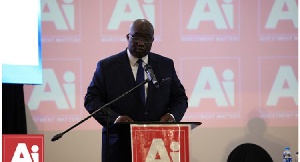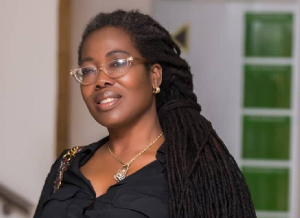The Minister of Railways Development, Mr. Joe Ghartey, has urged African investors to invest in the development of infrastructure in Ghana, where the security and fruitfulness of their capitals are guaranteed.
He said the prospects in railway development and energy renewable production, were particularly, bright.
Mr Ghartey was addressing the African Investors (Ai) CEO African Pension and Sovereign Wealth Fund Leaders’ Summit, recently held in Durban, South Africa.
He explained: “We are ready as a nation for investment and we are confident that our investment and business-friendly legal and institutional framework, political stability, improving and expanding economy, and availability of investment opportunities in the infrastructure sector provides an interesting cocktail of opportunity for investors in Ghana.”
Mr Ghartey represented Vice President Mahamadu Bawumia at the Summit, which was on the theme: “Facilitating Pension Fund Investment Partnership with African Asset Owners”.
The Summit showcased investment strategies and governance institutional-grade opportunities and instruments.
This is to de-risk and catalyse global and African institutional capital.
Mr Ghartey said Ghana, would in the next three and a half years, construct approximately 1,200 kilometres of rail to boost the economy.
He explained: “The building of a modern railway network, coupled with developing associated rail infrastructure under the programme; ‘From Stations to Cities’ seeks to take advantage of the rail network to bring accelerated economic development to the rail corridors to transform Ghana’s economy.
“This programme of developing associated infrastructure, including new industrial estates, inland rail terminal, new suburban housing and commercial centres, all create opportunities for investors.”
On the energy side, the Member of Parliament for Essikadu Ketan said, the Government had announced a policy to move to new power projects - from terminal to renewable energy - with a focus on solar and bio energy to offer opportunities for investors.
Ghana, he said, was rolling out a number of pro-investor policies to secure private sector partnerships to accelerate development; one of which was the elimination of ‘nuisance’ taxes in the 2017 Budget.
Mr Ghartey lauded the resolve at the Ai Heads of State Investment Working Lunch, last year, to mobilise Africa’s sovereign wealth and pensions funds for investment across the continent over the next 10 years to push the growth agenda.
The mission is to track and boost intra-Africa investments from its current low level of five per cent of total stock to 60 per cent over the period.
Private sector investment, Mr Ghartey emphasised, had been identified as key to bridge the infrastructure deficit in Africa and it was, therefore, important to develop clear strategies for the purpose.
“Unfortunately, the pension sector in Africa is not as large as it ought to be,” he noted. “With the exception of South Africa, the African continent is on the fringes of the global pensions industry.”
“According to the Global Pension Assets Study, the 10 biggest African markets comprise a combined asset value of $37bn and half of these assets are held in South Africa”.
In Nigeria, he said, the value of pension fund assets under the management as a proportion of GDP was five per cent.
“This compares rather poorly with some countries where pension fund assets under the management as a proportion of GDP is more than 100 per cent,” he pointed out.
Mr Ghartey, however, said the bright side of the low pension penetration rate was that there were opportunities for growth.
“In Ghana, for example, the assets under management of the pensions fund industry grew fivefold from 2008 to 2014,” he explained.
“Thus whilst Africa adopts measures to increase pension penetration it must also take steps to create an enabling environment for other pension funds, including US and Global Pension Funds and Institutional Investors.”
Also at the Summit were Mr Kwaku Agyenim-Boateng, Deputy Minister of Railways Development; Mr Mohammed Habib Tijani, Deputy Minister of Foreign Affairs and Regional Integration; Mr Solomon Asamoah, CEO of Ghana Infrastructure Investment Fund; and Mr Yoofi Grant, CEO of GIPC.
Business News of Wednesday, 10 May 2017
Source: GNA

















